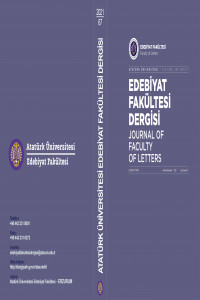Öz
Tarihin her devrinde şairler ile yöneticiler arasında övgü ve yergi üzerine kurulu bir ilişki süregelmiştir. Hiç şüphe yok ki Sultan II. Abdülhamid Osmanlı İmparatorluğu'nun son dönemlerinde en etkili şahsi-yet olup dönemin birçok edip ve şairi tarafından takdir edilmiştir. Aynı şekilde Mısırlı edipler de Hilafet bağı nedeniyle Osmanlı Devleti’nin Mısır’ın üzerindeki etkisi konusunda düşüncelerini gizleyememişlerdir. Bu dönemde Mısırlı Neo klasik şairlerden Hâfız İbrahim, şiirlerinde Batı emperyalizmine karşı İslam birliğini ve Osmanlının temsil ettiği hilafeti savunmuştur. Çalışmada Osmanlı dostu bir Arap şairin gözünden özellikle Sultan II. Abdülhamid’in 33 yıllık saltanatı boyunca Hilafet kavramı çerçevesinde Mısır ile İstanbul arasında oluşan siyasi ve sosyal bağları irdeleme amaçlanmıştır.
Anahtar Kelimeler
Kaynakça
- Dayf, Şevkî, (1971). el-Edebu’l-Arabiyyu’l-Mu‘âsır, Kahire: Dâru'l-Meʻârif.
- Demirayak, Kenan. (2015). Arap Edebiyatı Tarihi- Osmanlı Dönemi, Kayseri: Fenomen.
- Demirayak, Kenan. (1994). “Hâfız İbrahim’in Türkiye ve Türklerle İlgili Bazı Siyasî Şiirleri.” Türk Yurdu, Sayı: 9/80, 23-30.
- el-Cundî, Abdulhamid Sened. (1992). Hâfız İbrahim Şâʻiru'n-Nîl, Kahire: Dâru'l-Meʻârif.
- el-Fâhûrî, Hannâ. (1986). el-Câmi fi Târihi’l- Edebi’l-‘Arabî el-Edebu’l-Hadȋs. Beyrut: Dâru’l- Cîl.
- Emin, Ahmed. (1987). Dîvânu Hâfız İbrâhîm. Kâhire: el-Hey’etu’l- ʻÂmme li’l-Kuttâb.
- Gülsoy, Ufuk. (1998). “Hicaz Demiryolu Türkiye Diyanet Vakfı İslâm Ansiklopedisi”, İstanbul, Cilt:17, s.441-445. Ankara: Türkiye Diyânet Vakfı Yayınları.
- Hâfız İbrahim. (1987). Dîvânu Hâfız İbrahim. Kahire: el-Hey’etu'l-Mısrıyyetu'l- ʻÂmme li'l- Kuttâb.
- Hâfız İbrahim. (2012). el-Muellefâtu’l Kâmile. Kahire: Hindâvî.
- İsmail, Kâni, (1987). Dîvânu Hâfız İbrahim, Kahire: el-Hey’etu'l-Mısrıyyetu'l- ʻÂmme li'l- Kuttâb.
- Karakuş, Ömer Faruk. (2019). Hâfız İbrahim’in Şiirlerinde Osmanlı İzleri. Yayımlanmamış Yüksek Lisans Tezi, Atatürk Üniversitesi Sosyal Bilimler Enstitüsü, Erzurum.
- Kumeyhe, Câbir. (1987). Savtu’l-İslâmiyyi fi şi‘ri Hâfız İbrahim, Kahire: Dâru’l-Hidâye, 37.
- Mustafa, Ahmed Abdurrahȋm. (2000). “İki Tarafın Bakış Açısından Türk-Arap Münasebetleri’’. Osmanlı İdari Altında Araplar (s.373-412). İstanbul: İslam Tarih, Sanat ve Kültür Araştırma Merkezi (IRCICA).
- Savran, Ahmet. (1991). 19. yy. Osmanlı Döneminde Yeni Arap Edebiyatı, Erzurum:Atatürk Üniversitesi Fen-Edebiyat Fakültesi Yayını.
- Yazıcı, Hüseyin. (1997). “Hâfız İbrahim”, Türkiye Diyanet Vakfı İslâm Ansiklopedisi, İstanbul, Cilt:15, s.91-92. Ankara: Türkiye Diyânet Vakfı Yayınları.
- Yazıcı, Hüseyin. (1997). “Mısırlı Bir Şair Ahmed Şevki ve Şiirlerinde Sultan II. Abdülhamid.” İlmi Araştırmalar: Dil, Edebiyat, Tarih İncelemeleri, Sayı: 4, 179-192.
- Yılmaz, Nurullah. (2017). Modern Arap Şiirinde Yeni Bir Eğilim Kasidetu’n Nesr, Kayseri: Fenomen Yayınları.
Öz
In every period of history, there has been a relationship based on praise and satire between poets and rulers. There is no doubt that Sultan II. Abdulhamid was the most influential figure in the last period of the Ottoman Empire and was appreciated by many litterateurs and poets of the period. Sultan II. Abdulhamid was appreciated by many litterateurs and poets of the period. Likewise, the Egyptian litterateurs could not hide their thoughts on the influence of the Ottoman Empire on Egypt due to their connection to the Caliphate. During this period, Hafiz Ibrahim, one of the Egyptian Neoclassical poets, defended the Islamic unity and the caliphate represented by the Ottoman Empire against western imperialism in her poems. In the study, from the eyes of a Ottoman friendly Arab poet, especially during the 33 year reign of Sultan II. Abdulhamid, it was aimed to examine the political and social ties between Egypt and Istanbul within the framework of the concept of Caliphate.
Anahtar Kelimeler
Kaynakça
- Dayf, Şevkî, (1971). el-Edebu’l-Arabiyyu’l-Mu‘âsır, Kahire: Dâru'l-Meʻârif.
- Demirayak, Kenan. (2015). Arap Edebiyatı Tarihi- Osmanlı Dönemi, Kayseri: Fenomen.
- Demirayak, Kenan. (1994). “Hâfız İbrahim’in Türkiye ve Türklerle İlgili Bazı Siyasî Şiirleri.” Türk Yurdu, Sayı: 9/80, 23-30.
- el-Cundî, Abdulhamid Sened. (1992). Hâfız İbrahim Şâʻiru'n-Nîl, Kahire: Dâru'l-Meʻârif.
- el-Fâhûrî, Hannâ. (1986). el-Câmi fi Târihi’l- Edebi’l-‘Arabî el-Edebu’l-Hadȋs. Beyrut: Dâru’l- Cîl.
- Emin, Ahmed. (1987). Dîvânu Hâfız İbrâhîm. Kâhire: el-Hey’etu’l- ʻÂmme li’l-Kuttâb.
- Gülsoy, Ufuk. (1998). “Hicaz Demiryolu Türkiye Diyanet Vakfı İslâm Ansiklopedisi”, İstanbul, Cilt:17, s.441-445. Ankara: Türkiye Diyânet Vakfı Yayınları.
- Hâfız İbrahim. (1987). Dîvânu Hâfız İbrahim. Kahire: el-Hey’etu'l-Mısrıyyetu'l- ʻÂmme li'l- Kuttâb.
- Hâfız İbrahim. (2012). el-Muellefâtu’l Kâmile. Kahire: Hindâvî.
- İsmail, Kâni, (1987). Dîvânu Hâfız İbrahim, Kahire: el-Hey’etu'l-Mısrıyyetu'l- ʻÂmme li'l- Kuttâb.
- Karakuş, Ömer Faruk. (2019). Hâfız İbrahim’in Şiirlerinde Osmanlı İzleri. Yayımlanmamış Yüksek Lisans Tezi, Atatürk Üniversitesi Sosyal Bilimler Enstitüsü, Erzurum.
- Kumeyhe, Câbir. (1987). Savtu’l-İslâmiyyi fi şi‘ri Hâfız İbrahim, Kahire: Dâru’l-Hidâye, 37.
- Mustafa, Ahmed Abdurrahȋm. (2000). “İki Tarafın Bakış Açısından Türk-Arap Münasebetleri’’. Osmanlı İdari Altında Araplar (s.373-412). İstanbul: İslam Tarih, Sanat ve Kültür Araştırma Merkezi (IRCICA).
- Savran, Ahmet. (1991). 19. yy. Osmanlı Döneminde Yeni Arap Edebiyatı, Erzurum:Atatürk Üniversitesi Fen-Edebiyat Fakültesi Yayını.
- Yazıcı, Hüseyin. (1997). “Hâfız İbrahim”, Türkiye Diyanet Vakfı İslâm Ansiklopedisi, İstanbul, Cilt:15, s.91-92. Ankara: Türkiye Diyânet Vakfı Yayınları.
- Yazıcı, Hüseyin. (1997). “Mısırlı Bir Şair Ahmed Şevki ve Şiirlerinde Sultan II. Abdülhamid.” İlmi Araştırmalar: Dil, Edebiyat, Tarih İncelemeleri, Sayı: 4, 179-192.
- Yılmaz, Nurullah. (2017). Modern Arap Şiirinde Yeni Bir Eğilim Kasidetu’n Nesr, Kayseri: Fenomen Yayınları.
Ayrıntılar
| Birincil Dil | Türkçe |
|---|---|
| Konular | Sanat ve Edebiyat |
| Bölüm | DİL VE EDEBİYAT |
| Yazarlar | |
| Yayımlanma Tarihi | 1 Aralık 2021 |
| Gönderilme Tarihi | 30 Mart 2021 |
| Yayımlandığı Sayı | Yıl 2021 Sayı: 67 |

